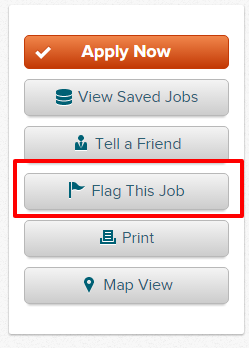
Whether you use JobsinJapan.com, a university bulletin board, free paper or any other online employment resource, we want you to be safe from scams and fraudulent job postings. We would like to share what to watch out for when you see job postings online.
The Good – We at Jobsinjapan.com review each employer and position listed on our site.
The Bad – It is impossible to guarantee that every employer will engage in legitimate, ethical and or legal behavior after submission of a position.
Preemptive Strike – Over the years we have received quite a few dubious postings, which have not been allowed on the site. Even with our best efforts, however, scammers are ever creative, so there is a possibility of such an ad getting through our screening process. As such we would like to provide site users with some advice to protect yourself.
Disclaimer: Jobsinjapan.com does not endorse or recommend any particular employer, and a posting to a job on our site does not constitute an endorsement or recommendation. While each company and job is screened before going online, we are not the employer. Thus Jobsinjapan.com explicitly makes no guarantees about the accuracy of the information provided by the employer. Jobsinjapan.com is not responsible for any aspect of employment without limitation. It is the responsibility of job seeker to perform due diligence in researching employers when applying for or accepting employment and to thoroughly research the facts and reputation of each organization to which they are applying. Job seekers should also be prudent and use common sense and caution when applying for or accepting any position.
These are some of the red flags to look out for in job postings online. These are the things that alarm us in postings, so now you too can identify such scams and fraudulent job postings.
The following red flags are general markers to help you conduct a safer job search and protect your identity. These red flags in no way cover all possible instances of fraud or every instance of suspicion. Therefore, please always use your own alertness and discretion when applying to a position or interacting with a potential employer.
Fraudulent job postings try to take your money, personal information, or both. The jobs often appear easy and convenient ways to make money with very little effort.
*** Each posting on the site has a “Flag” button. This button is to tell us that you think that there is something suspicious with the employer or job listing.

The Basics in Avoiding a Job Posting Scam
- Do not give your personal banking, PayPal, or credit card information to a new employer.
- Do not agree to have funds directly paid into any accounts by a new employer until after your actual employment begins.
- Do not allow employers to use your account to transfer money and retain a portion for payment.
- Do not respond to suspicious and/or “too good to be true” unsolicited job emails. As the saying goes “if it sounds too good to be true, it probably is.”
- Japanese law specifically prohibits agents from taking fees from workers for the purpose of placing them in jobs. There are a few exceptions in areas like internships or outplacement services, but such exceptions would be governed by the licensing laws for those activities. In general, be very wary of any employer requiring an applicant to pay fees for job “leads”.
Red Flags: How to Identify a Potentially Fraudulent Jobs (may be legitimate but should proceed with caution):
The company has a legitimate website; however, the hiring manager exclusively uses a free e-mail account such as Yahoo or Gmail
There are many language schools that do not have their own domain so this could very well be a legitimate case. You can easily confirm this by calling the phone number on the company’s website. Sometimes the posting may even appear to be from a reputable, familiar company, but the email address does not match the domain used by representatives of the company.
The company URL is not active, does not exist, or transfers users to another unaffiliated website
Use the Wayback Machine at www.archive.org to view the history of and past contents of a Web site to gauge how established a business may be. Web sites that have recently appeared on the Web should require closer scrutiny and examination. When there is any doubt, display full headers and attempt to look up the originating server from which an e-mail came from. Does the country match where the employer is supposed to be located? Or is the server located in some obscure country with dubious law enforcement? Some free e-mail services only provide their own IP address, but many provide the originating IP as well.
The position offers a high wage for a job that requires minimum skills
Work-from-home jobs – Some of these are legitimate (i.e., translation jobs, some IT jobs) but do your homework first. In general, always be more alert around any work-from-home jobs that tell you that you can make $10,000 a month with minimal work. If this were true, everybody would be doing it.
It is difficult to find actual contact information
We will not post a job without that information but be careful if you cannot find this when looking for jobs elsewhere. Be wary of phone numbers outside of Japan where scrutiny of their use varies greatly by country. In Japan, legal identity of a phone owner (cellular and landline) is strict, and the majority of scammers, who are also outside of Japan in most cases, will not have a Japan phone that they can answer. At the same time, bear in mind that a few scammers may have overcome the Japan phone test, and that a minority of scammers may be located in Japan as well.
Be careful, and if you have a concern, contact the company and ask if the person actually works there.
Scammers are getting increasingly creative. If you see anything suspicious, please flag the job or let us know at [email protected].













